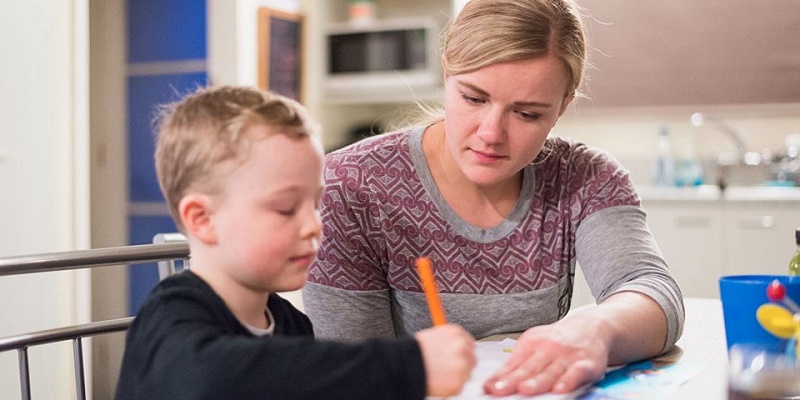All those who are or have been tutors throughout your career as teachers, you will have found during the interviews with parents that many of them are lost when it comes to helping their children to do homework. Many of these parents tell the tutor their concern about the difficulty of educating children with homework once the school day is over. Let’s discover how to motivate child.
How to motivate child to do homework

Parents have commented that one of the most common homework problems is that there is little motivation to do it. This problem is common in families that have children with learning problems. Children who are motivated do their homework alone, begin and complete it on time, participate in reviews, respond favorably when corrected, pay attention, and finish it even if it becomes more difficult. When children exhibit problems in any of these areas, teachers have often described them as children who are not motivated.
Recommendations
The following are some specific strategies that parents can use to motivate their children to do their homework on time; without having to remember continually: have you done your homework?

Give him -from the cradle- example with his diligence in the accomplishment of his tasks in the home. Start by unloading the car, ordering the purchase, preparing the dinner … because if the first thing you do when you get home is to lie on the sofa … it will be difficult for your child not to imitate this behavior. If, on the other hand, your children see you doing your pending work with good humor and promptness: the good example will serve as the best lesson.
From the first age, from the age of two, impose on the child some easy “task” that he can perform: pick up the toys, order the bath, put the shoes together.
Clap your “squiggles” from the first year of school. And comment aloud: “how well you have done your homework.” It will take care of the word. He will seek his applause. Give when the time comes to do your homework your own space, large enough, well lit and well equipped with the necessary school materials and free of distractions (no television nearby, no music …)
- School Materials
- Pencils / pens / markers
- Pencil sharpener
- Draft
- Writing paper
- Glue/adhesive tape
- Rules
- Scissors
- Stapler
- Calculator
- Dictionary
Control and limit significant distractions

Some children and teenagers prefer to do their homework while they are listening to music or watching TV, they explain that this helps their concentration. These types of sounds are a distraction. Visual distractions and music often interfere with more difficult tasks than with easy and common jobs. It sounds like television, conversations, and music with words tend to cause more distractions than instrumental music or other types of sounds. Generally, one rule you must maintain is that you must control and limit all kinds of distractions, such as telephone, television, music with words, and interruptions, when your child is doing homework, especially when it is a difficult job. If your child is doing his work, he should not worry so much about the sounds.
Help your child to do homework

One of the benefits of homework is that it can help your child develop his organizational and time distribution skills. Have your child decide the priorities, the order in which he will do his homework, making work more difficult between easier tasks.
Find out the number of tasks

To track your child’s progress in the task, you must know in advance how much time you should spend. Talk to the teacher to find out about homework requirements and to know how much homework is required for students at your level.
Do not help if he never ask

This recommendation has to do with your place in your child’s homework. Schools recommend that parents participate in their children’s education. However, what should you do in the case of the task? The purpose of homework is to give children an opportunity to practice what they have learned in school. You should not have to help your child complete his homework. Your help will make your child dependent on you. Your goal should be to help and provide your child with the support he needs to finish his work.
Support and encourage your child

Be positive when your child works on his or her homework. Avoid using criticism or punishment to try to make your child do his homework. These methods will have a contradictory effect in the future. You want your child to face his or her obstacles in the task with confidence in their abilities, feel confident in their abilities and be proud of their accomplishments. These goals are achieved over time. When problems arise, you should understand the problem and help your child find a solution.
Praise the effort and independence

Parents should try to praise their children for the effort they make in the task and when they try to do their work independently. Praise effort and independence even if your child does not do everything correctly during their first effort. A rule that can be used when praise is used: do it frequently, do it immediately, make it impactful.
A striking compliment is one that is offered in an affectionate tone and includes a comment that lets your kids know that you are happy with your work. “I like that you’re working so hard on your homework tonight. I am very proud of you. “Frequent praise is directly related to the type of effort your child puts forth. The resulting independence can produce positive emotions, confidence, and a feeling of control over their learning.
One of the ways to communicate to your child that homework is important is to ask him about his homework on a daily basis. It may be necessary for you to review the task with him before he starts doing it to make sure he understands what he should do. Do not sit down with him to review each section of his homework.
Appreciate

When your child’s work has been completed, when teaching it, review it to see its accuracy and clarity. If you have performed a careless task, it must be done again. For younger children, teach them the parts that are incorrect and get them to correct it with themselves. Older children can be suggested to make changes. For example, you can tell your child the number of mistakes you have noticed on a page or section without telling you what is wrong, so your child will have to find the errors and correct them. This method will give you the practice to review your work.
Communicate with the teacher

Homework is a partnership between the school and home designed to improve your child’s learning. Consider talking to the teacher when any of the following cases occurs. When your child has little homework Does your child have little homework because the teacher is not giving homework or because your child is not informing you about the homework?
When your child does not know how to do his homework Homework should focus on reviewing what you have learned in school and integrating information that you already knew. The purpose of the assignment is not to teach your child complicated material. When your child has problems understanding his homework or does not know how to do it, he may not yet have learned to do what the homework requires. It can also mean that your child is having problems in class, attention problems or learning a subject.
Does your child take too much time for homework?

Too much homework can take away your child’s spirits and interfere with family priorities. If your child is constantly taking too much time with homework, investigate if he is bringing work that must be completed during class. This may indicate that your child has problems in the class. Typically, class work must be completed in class. If your child consistently does not finish work in class, the school may need to make modifications to the class or provide your child with services to correct the problem. If your child is using his time satisfactorily and finishes his work, but it takes more time than the teacher provides, talk to the teacher and suggest that the work is reduced.
Most children and adolescents adopt the values of their parents. Teach your children that you value education by doing educational activities in front of them. Let them see you reading. Keep reading materials in your home. Tell them about news events. Take them to the library.
Extra tips for tutor and guardian

Know how to differentiate between homework and study. Many times parents ask their children when they get home if they have homework for that afternoon and they respond that they do not. And in many cases it is true. Students and parents discuss the error of identifying homework with procedural exercises such as mathematical operations, reading comprehension, drawing up of diagrams and summaries. The question parents ask, therefore, is wrongly formulated. The student does not always have activities related to the procedures of the different areas. What is daily is the study of what has been worked in class during the morning through the different subjects.
Agree what will be worked during the afternoon. In order for the school activities in the afternoon to be effective, whenever possible, and parents have the opportunity to be at home, they must agree with their children what will be worked during that afternoon. In this way the father and the student share the same information. It is very useful to consult the agenda, but you do not always have to trust what there is – or what there is not – pointed.
Agree on the time that will be devoted to carrying out school activities. Parents and children must agree on a reasonable schedule for the completion of homework. We must avoid exceeding time and dedicate to these tasks a time commensurate with the workload.

School activities are carried out by the children, not by the parents. The workload that the children have must be assumed by the children themselves. Many times parents feel anxious because they do not have the necessary knowledge to help them in their studies. This is a very common mistake. In general, the children are perfectly capable of carrying out school activities, because these have already been previously worked in class with the help of the teacher. Parents, on time, can help or guide, but should not make the mistake of physically accompanying them in their performance.
Render account of the agreed tasks . It is very useful that once the child has finished with the tasks of that afternoon, teach, explain or demonstrate what has been worked on. For their part, parents can review the tasks, ask them questions, give them some advice or guidance. This involves little effort of time and dedication and the son feels obliged to give an account of his work to his parents.
If these actions are put into practice we will see that the dedication time that parents are supposed to invest in their children’s schoolwork does not exceed 10-15 minutes. You also have to remember if you follow these guidelines parents will not be in the pressure of knowing the knowledge that is relevant to their children and not to them.
As a recapitulation, these would be the steps to follow: distinguish between homework and study, previously agree on the tasks to be performed. Set a time limit for work, let the child do the tasks individually, monitor if school tasks have been done previously agreed.






